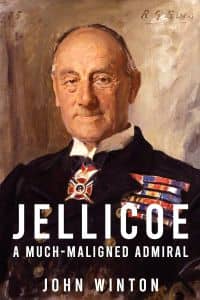An engrossing reassessment of the Commander-in-Chief of British naval forces during World War One.
An ideal book for readers of Walter R. Borneman, Andrew Lambert and Ben Wilson.
On 31 May 1916 the British Grand Fleet engaged the German High Fleet in the greatest naval engagement of the First World War. Yet rather than landing the knock-out blow that Jellicoe had been hoping for the battle proved to be inconclusive.
Why had the Royal Navy, which outnumbered the enemy, been unable to defeat their opponents? And could Jellicoe have done better in leading his fleet?
John Winton’s magnificent reappraisal of John Rushworth Jellicoe provides answers to these questions that have raged ever since the conclusion of the battle but also gives thorough insight into who Jellicoe was and how naval warfare was conducted in the early twentieth century.
Jellicoe’s full-career is uncovered, from his entry into the Victorian navy, of ironclads, muzzle-loading guns and sail-drill, through to his years rising the ranks including during the Boxer Rebellion when he was badly wounded, before exploring his life before, during and after the First World War.
Through in-depth research and utilising a wide-array of sources Winton’s book offers a balanced perspective on Jellicoe, assessing who this man was and how he led the Royal Navy into its first major twentieth-century battle.
